Philip A. Salem, MD, Director Emeritus of Cancer Research at St. Luke’s Episcopal Hospital, Houston, was born and reared in Bterram, a village that overlooks the Mediterranean Sea. “I had the most beautiful and blessed childhood, as I lived in a household dominated by a father who believed in the power of education and a mother who believed in the power of love. To me, the whole village was like my extended family. To this day, the village remains my center of gravity,” said Dr. Salem.
Early Years
During his formative years, his beloved mother developed a condition that caused recurrent attacks of painful kidney stones. Seeing his mother suffer from a medical condition motivated Dr. Salem to pursue a career in medicine.
After high school, he entered the American University of Beirut (AUB), attaining his medical degree in 1965. Dr. Salem entered an internal medicine residency program, intent on becoming a nephrologist. However, during his third year, a patient altered his career path forever.
PHILIP A. SALEM, MD
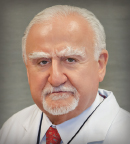
TITLE
Director Emeritus of Cancer Research, St. Luke’s Episcopal Hospital, Houston
MEDICAL DEGREE
Medical School of the American University of Beirut
ON WORKING IN BEIRUT DURING WARTIME
“My house in Ras Beirut was a 5-minute walk from the hospital. It was demolished four times, and I rebuilt it four times. Despite these troubles, I never entertained leaving Beirut.”
“A woman I loved immensely developed ovarian cancer, and I accompanied her through her journey with the disease. A week before she died, she looked at me very peacefully and said, ‘If you love me, you should specialize in cancer medicine. You may find one day a cure to my disease.’ That conversation and night haunted me my whole life, and indeed I changed gears. After her death, my decision was final: cancer medicine would be my life’s work,” related Dr. Salem.
Arriving in the Big Apple
In 1968, at age 27, Dr. Salem found himself some 6,000 miles from home, staring at the doors of Memorial Sloan Kettering Cancer Center (MSK). Asked about the events that led him there, Dr. Salem responded: “During residency, when I decided to become an oncologist, I asked one of my teachers where I should go for my training, and without hesitation, he said MSK. So, I applied and was accepted. AUB was like a small slice of American culture, plus my four brothers before me had all gone to universities in America, but still nothing had prepared me for midtown New York City. The 24/7 level of lights and noise and traffic was a bit overwhelming at first, and for the first several months, I was truly unhappy and missed my home and family.”
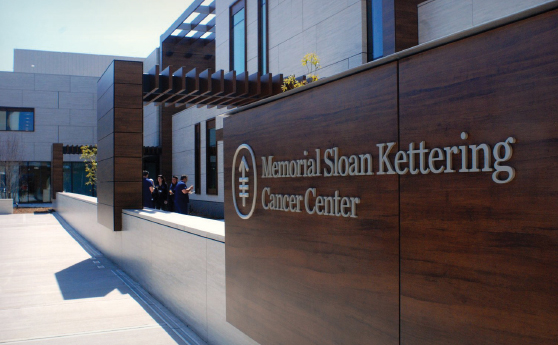
“I was not assigned an apartment to live in like all of my colleagues,” he explained. “Instead, I was asked to live in a patient’s room on the 10th floor of James Ewing Hospital. This ended up being a great privilege for me, as I did not have to commute and spend long hours navigating the busy streets of New York. All I had to do was walk the two stories down where all my patients were on Ewing 8. This floor was famous, as it was considered the first venue for cancer research in America.”
Dr. Salem continued: “My first boss was Bayard Clarkson, President of the American Association for Cancer Research in 1980 and 1981. He was Chief of the Leukemia Service. Above him was David Karnofsky, the father of cancer medicine and a man with a very imposing presence. The first assistant to Dr. Karnofsky was Irwin Krakoff. These two men shaped my professional future in America.”
A Storybook Beginning
According to Dr. Salem, his new life in America was not unlike a storybook with pages filled with wonder. Within 3 months he was treating a patient who was a close relative of Aristotle Onassis, and the young doctor suddenly found himself standing next to Jackie Kennedy, the former First Lady who had mesmerized the world. It was the beginning of what would become a lifelong relationship with Mr. Onassis.
Then, his legendary mentor, David Karnofsky, was diagnosed with primary lung cancer and metastasis to the brain. “At that time, my relationship with Dr. Karnofsky was like father and son. After treatment with radiotherapy, he felt much better and was happy to tell me he had received an invitation from the Shah of Iran to visit Tehran and inaugurate the newly established Taj Pahlavi Cancer Center. Then, he told me he planned to stop in Beirut and visit my family; indeed, he did and stayed 3 days with my parents. He was impressed that my father spoke English and French and was knowledgeable about American politics. When he returned to New York, he gave a speech about the trip and projected pictures showing my father, my mother, and the people of the village. I was in tears. What a privilege that a man of his stature would visit a remote village in Lebanon simply to check the background of a professional son of his,” he shared.
Dr. Salem continued: “A week before his death, Dr. Karnofsky told me not to say no to a wish of his. He asked that when I finish my training at Memorial, I not return to Lebanon but instead go to Houston for 1 more year of training at the MD Anderson Cancer Center. He wanted me to work with Emil (Tom) Frei and Emil Freireich for at least 1 year. At that time, I had not heard of MD Anderson, and after 2 years at MSK, I was so homesick and ready to return to Beirut. However, I could not say no to the death wish of a man I loved like a father.”
Returning Home With Big Dreams
In 1971, after 2 fruitful years at MSK, Dr. Salem did a 1-year fellowship at MD Anderson Cancer Center, which was still in its nascent stage of development. Following his fellowship, Dr. Salem was offered several wonderful opportunities, one by Tom Frei at Dana-Farber Cancer Center, which was just opening. But after 3 years of training in the United States, Dr. Salem was eager to return home.
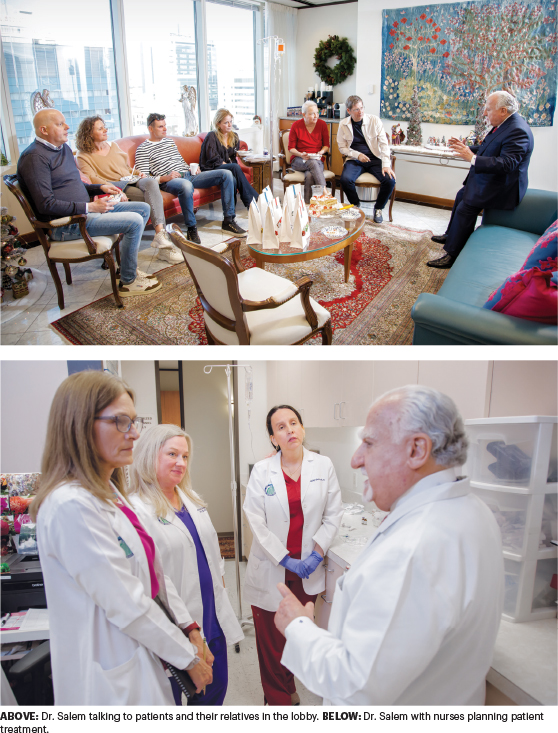
“I arrived back in Beirut in the summer of 1971 and joined the faculty of AUB in September 1971. I thought this would be my home, where I belonged. I was the first full-time faculty member at the University who was totally devoted to cancer treatment and research. I had big dreams, but little did I know, big wars were coming soon. At that time, cancer was almost a synonym for suffering and death. The public and most doctors believed cancer was not a treatable disease. Consequently, there was a mountain of misconception I had to climb. I thought education was the key and the most important weapon we had against this disease and the misconceptions around it,” said Dr. Salem.
Working Amid War
According to Dr. Salem, of the 15 subsequent years he worked at AUB, the first 12 were served in wartime. However, Dr. Salem persevered, and in spite of the difficult surroundings, he published his research papers in peer-reviewed medical journals such as Cancer.
“Most of the articles I published were written in a bunker under the rain of bombs showering Beirut. It was a great challenge to wake up every morning in the bunker, walk up 13 floors, wondering whether your wife was still alive or not, taking a quick shower, and then walk to the hospital and treat patients with cancer when healthy ordinary people were being killed in the streets. I was determined to do my job, and my job was a passion I had to fulfill. My students followed the same example, and despite the security troubles and the risks of dying, all came every day, treated patients, worked on our research projects, and then returned home late in the evening, not knowing whether their homes were still there or our families were still alive,” he recalled.
Dr. Salem continued: “My house in Ras Beirut was a 5-minute walk from the hospital. It was demolished four times, and I rebuilt it four times. Despite these troubles, I never entertained leaving Beirut. One advantage of being in Beirut then was that I was one of the few doctors who treated cancer in Lebanon and most of the Arab World. I treated kings and presidents and got to know at very close range many powerful politicians in the Middle East who were, in one way or another, entangled with the war in Lebanon. I experienced and saw vividly the interfacing between medicine and politics. Many times, while I was in the bunker, I thought of how ironic that was. The top military man in the Syrian Army who I had been treating for cancer was the one showering the city with bullets and bombs. He is the one who put me in the bunker. It was also ironic that when my eldest brother became Secretary of State in Lebanon, he negotiated with Syrians; little did he know that one of the most influential people across the table from him was a patient of his brother’s.”
A Tough Decision
During his 15 years at AUB, Dr. Salem established a world-class cancer program. “The AUB had no financial resources to support research; however, despite these obstacles and a cruel war, we had the determination and established a research group. My research team was one of the first to describe a new disease, limited to the Mediterranean shores, called immunoproliferative small intestinal disease. This disease was a model of how recurrent infections in the gastrointestinal tract, if left untreated, will eventually deteriorate into cancer. At that time, this concept was considered heresy. It was only thoroughly accepted by the medical community after it captured the Nobel Prize in 2005. Two Australian gastroenterologists proved that Helicobacter pylori in the stomach is the cause of peptic ulcer and stomach cancer. This concept is now one of the major pillars of cancer research, and it is estimated that more than 25% of cancers are related to infections,” explained Dr. Salem.
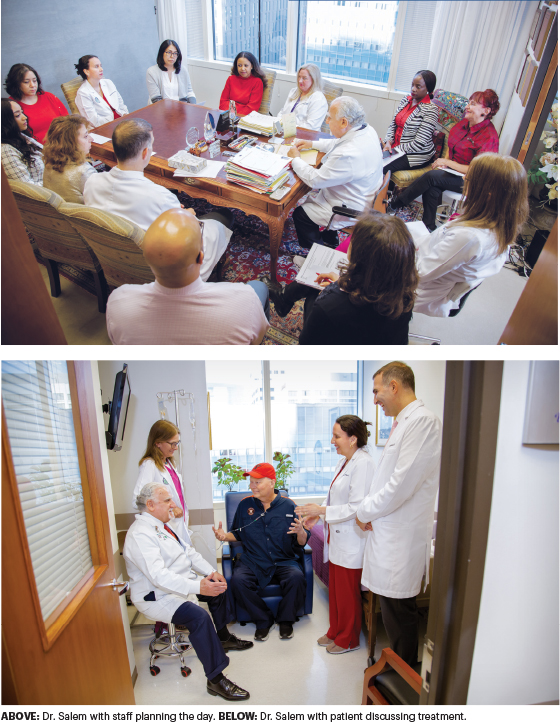
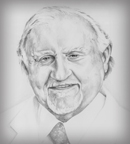
Portrait of Dr. Salem by a patient.
Despite his love for his homeland, the ravages of war finally became too much. After a failed attempt by militia to kidnap Dr. Salem and hold him for ransom, he felt forced to leave the country. “The militia had commissioned a young man to execute my kidnapping. Ironically, he was a patient I cured of testicular cancer. The night before he was to kidnap me, he visited me to let me know he was in charge of the operation and advised me to stay home.”
The next day, Dr. Salem decided to leave the country. A few days later, he escaped at night with his family in a helicopter to the island of Cyprus. “From there, I took a flight to Houston. When I landed there in 1987 with my wife and three young children, I felt three-quarters of me had already died and was buried in Lebanon, and I was coming with the remaining one-quarter only to guarantee the safety and future of my children. I thought my career was over. In fact, I believed my life was over,” Dr. Salem said.
That night, he stayed at a hotel across the street from MD Anderson. “I was so thankful and appreciative to my boss and friend, Irwin Krakoff. Dr. Krakoff was then Chief of Medicine at MD Anderson. When I called him over the phone and told him I would like to return to Houston, he told me I should do so immediately and could have any job I wanted except his. Looking back at that time, I can never thank him enough,” shared Dr. Salem.
Building a Career Based on Core Patient Principles
After 4 years at MD Anderson, Dr. Salem became Director of Cancer Research at St. Luke’s Episcopal Hospital in Houston. At the same time, he established a private practice at Salem Oncology Center in the Houston Twin Towers, which was then owned by St. Luke’s.
“For the past 32 years, the 16th floor of St. Luke’s Medical Tower has been my professional home,” he continued. “I was there for 20 years, and some 12 years ago, St. Luke’s established a Chair in Cancer Research that carries my name in honor of my contributions to cancer medicine. Also, 5 years ago, St. Luke’s established an annual oncology lecture carrying my name. At Salem Oncology Center, I had the privilege and pleasure of establishing professional oncology colonies in Italy and Mexico.”
Dr. Salem continued: “We made Salem Oncology Center feel like a home away from home, as many of our patients come from abroad. There is a culture of love, friendship, hope, perseverance, and faith in the corridors of the center. Patients are thoroughly educated about their diseases and their treatments. At all times, they are embraced by love and compassion.”
A Half Century of Contributions
After more than a half century contributing to the oncology community, Dr. Salem has no plans to retire. Asked how he has managed his work-life balance over the arc of his career, he commented: “When I get home at about 8:30 PM, I close the door and transition from doctor to family man. I try my best to be a good father and husband, which brings incredible joy in life. I also exercise at the gym every morning, which is a critical part of maintaining mind-body health. And for added pleasure, I write. I have published many articles and two books, the most recent being Defeating Cancer: Knowledge Alone Is Not Enough. I’ve been blessed to have had an incredibly rewarding career in oncology.” He added: “In my 55 years of cancer medicine and research, my eyes were always on the ball. The ball was not a Nobel Prize; it was salvaging human life.”

